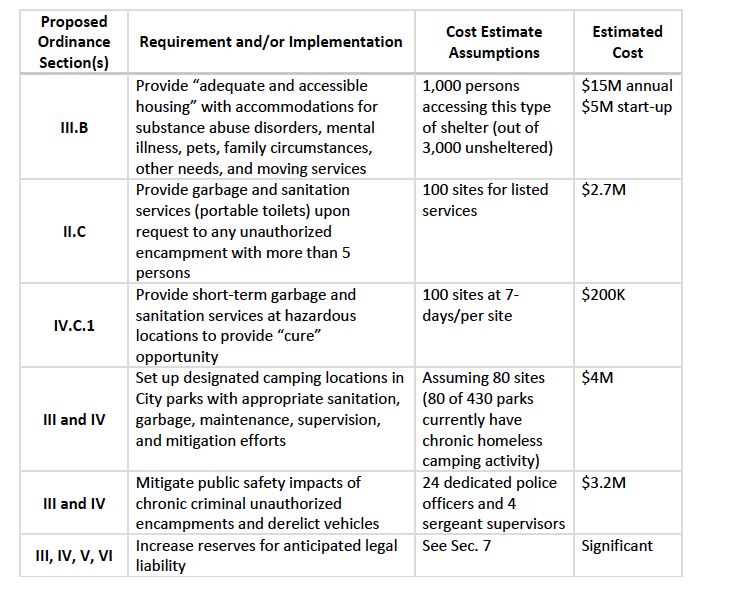City Department Directors Reject Alternative Proposal to End Homeless Sweeps

1. Several top city officials, including the police chief, the head of parks, the head of the human services department, and the city budget director, sent a letter to the city council yesterday strongly criticizing a legislative proposal the ACLU and other civil rights groups made last week that would set new protocols for removing homeless people from unauthorized encampments.
It’s no surprise that Mayor Ed Murray's executive department heads criticized the proposal; the mayor has set up a task force of his own charged with revising the city’s approach to responding to unauthorized encampments. The task force had their first meeting last night and are supposed to come out with their proposal in a month. The task force is made up of both homeless advocates and service groups such as All Home and the Downtown Emergency Services Center as well as business groups such as the Ballard Chamber of Commerce and a member of the Neighborhood Safety Alliance which has advocated a tough on crime approach to homelessness.
The ACLU and Columbia Legal Services, which both rejected an offer to be part of the task force, have now leapfrogged the mayor with their proposal; Seattle/King County Coalition on Homelessness has also signed on to the draft legislation. And city council human services chair Sally Bagshaw told me last week that while she was committed to working with Mayor Murray, she and a majority of the council were supportive of a “slightly modified” version of ACLU’s proposal that “clarified responsibilities.” (Bagshaw is also on the mayor’s task force.)
Currently, the city must provide 72-hour notice to people in the encampments before removing them and must also offer social services.
The ACLU/Columbia Legal Services/SKCCH proposal would restrict the city’s ability to clear out encampments. The proposal says the city must provide a 30-day waiting period before doing a sweep of an unauthorized site, must provide housing, and, must make efforts in that time to connect campers with social services. The city must also make a more serious effort to keep people from getting separated from their belongings.
If people are camping on what is deemed a “hazardous,” “unsafe,” or “unsuitable” site such as a site that’s dangerously near a road or one that’s impeding public right of way, the city must provide at least 72 hours notice, access to garbage and sanitation services on site, provide residents an opportunity to change the unsafe conditions, provide at least 2-day notice to all individuals at location, and must identify and make available a nearby alternative encampment location.
Yesterday’s strongly worded response against the proposal from the group of city department directors begins by saying the city needs to “balance our City’s compassion for the homeless with the City’s responsibility to protect health and safety and be a steward of public property for a variety of uses…The proposed legislation does not strike the right balance and would authorize camping throughout the City of Seattle.”
Going on to document the “dramatic…impact” of the ACLU ordinance, the letter, using examples from each director’s purview, says, for example,
From the Parks Department:
“In most circumstances, Parks would not be able to remove unauthorized camping structures According to the Superintendent of Seattle Parks and Recreation, Jesús Aguirre, the practical effect of this proposed ordinance would be to fully open Parks land to camping.”
From SDOT:
In many instances, tents and other living structures completely prevent members of the public or people with disabilities from safely using a sidewalk. … According to Seattle Department of Transportation Director Scott Kubly, implementation of this bill would put pedestrians at risk and require that SDOT divert significant resources to ensure compliance with federal laws, including the Americans with Disabilities Act. … SDOT is also concerned about the blockage of any sidewalk that is proximate to schools, parks, community centers, transit stops and other destinations that people of all ages and abilities must be able to access.
And from the SPD:
As an example, for much of this year the Chinatown/International District complained of a large unauthorized encampment on the sidewalks under I-5 at Jackson and King Streets. At that encampment, Seattle police responded to a shooting, stabbing, several robberies, significant drug distribution, prostitution, assaults threats, persons in crisis, and narcotics overdoses. The public safety impacts were particularly felt by members of the elderly immigrant population that often use those streets for access to a food bank and by the students of a nearby high school and Kung Fu program. Several nearby businesses shut down as a result and the Wing Luke Museum stated that it was on the verge of permanently closing because of criminal activity associated with these unauthorized encampments.
Under this proposed legislation, if the police identified tents on public property with significant suspected criminal activity including theft, forced prostitution, and drug distribution, the City would only be able to remove those tents after going through an onerous process to include finding “nearby” public property for the residents to camp and providing moving services to that new location.
The city's budget director also said "tens of millions of dollars" would be spent implementing the ACLU rules adding in italics: "Every dollar spent on supporting outdoor living is a dollar not spent moving someone into housing" while providing a chart of estimated costs:

2. If you follow PubliCola's twitter feed, you'll know I was at the world's most important Seattle Office of the Hearing Examiner meeting yesterday.
In all seriousness, the case being heard on the 40th floor of the municipal building in room 4009, is one of the most significant political things happening in the city right now: It's nothing short of the traditional neighborhood movement's last stand against the city's efforts to increase density in single family zones.

City council member Mike O'Brien has proposed legislation that would make it easier for people to build accessory dwelling units (ADUs) and detached accessory dwelling units (DADUs) (basically a mother-in-law apartment inside an existing single family hous and stand-alone backyard cottage on the same lot.)
Property owners can already build ADUs and DADUs—but they're limited to just one or the other—and they must live in one of the properties. O'Brien's changes would: allow both an ADU and DADU on the property, would only require the property owner to live on the site for a year, would get rid of the required accompanying off-street parking spot, and would tweak size and lot size requirements—going from allowing DADUS to be 800 square feet to 1,000 square feet and allowing them on lots that are 3,200 square feet as opposed to the current 4,000 square foot requirement.
The hearing brought out some stereotype NIMBYs (overheard during the breaks from some women criticizing proponents of more density "The Apodments! Those are the future slums of the world!" and “Did you raise children?”)
But up at the hearing table, Marty Kaplan, a member of the Queen Anne Community Council, which brought the appeal (the QACC is challenging the city’s planning department ruling that O’Brien’s legislation doesn’t require a broader environmental review) made a more well reasoned argument.
Kaplan was certainly dramatic, though. He said it was “unconscionable” that the city didn’t think adding density to single family zones required further review of “measurable impacts” on infrastructure, parking, and potential displacement. And he characterized the plan as “the largest rezone in the city ever,” noting that 125,000 pieces of property were being rezoned. Ultimately, he made two basic arguments: 1) creating the opportunity to build three units where now there can be just two, will create development speculation that will price out and displace affordable housing and 2) taking away the owner-occupancy requirement also makes speculation more likely.
The city countered with testimony from Sam Lai, the co-founder of Green Canopy Homes, which actually does speculation on teardowns and rebuilds. Lai flatly disagreed with the notion that the changes were significant enough to create a sweeping trend (currently, it represents a minuscule portion of the market). And on cross examination from Kaplan's attorney, Lai, who lives in Queen Anne himself, refused to agree with the "evidence" (the recent Seattle Times article on teardowns that said the spec market on teardowns showed a value of 3-to-1 on rebuilds.) Lai pointed out counter examples from his own work which, he said, mostly replaced one home with less expensive units in a multifamily building—an argument that the enviro group Sightline has documented.
The hearing continues today.




